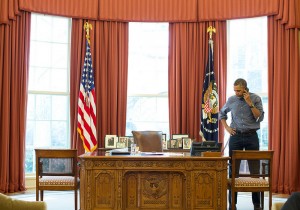Source: Consortium News

President Barack Obama has been trying, mostly in secret, to craft a new foreign policy that relies heavily on cooperation with Russian President Vladimir Putin to tamp down confrontations in hotspots such as Iran and Syria. But Obama's timidity about publicly explaining this strategy has left it open to attack from powerful elements of Official Washington, including well-placed neocons and people in his own administration.
The gravest threat to this Obama-Putin collaboration has now emerged in Ukraine, where a coalition of U.S. neocon operatives and neocon holdovers within the State Department fanned the flames of unrest in Ukraine, contributing to the violent overthrow of democratically elected President Viktor Yanukovych and now to a military intervention by Russian troops in the Crimea, a region in southern Ukraine that historically was part of Russia.
Putin also is reported to have verbally dressed down Israel's Prime Minister Benjamin Netanyahu and then-Saudi intelligence chief Prince Bandar bin Sultan over what Putin considered their provocative actions regarding the Syrian civil war.
American neocons -- along with Israel and Saudi Arabia -- had hoped that Obama would launch military strikes on Syria and Iran that could open the door to more "regime change" across the Middle East, a dream at the center of neocon geopolitical strategy since the 1990s.
This neocon strategy took shape after the display of U.S. high-tech warfare against Iraq in 1991 and the collapse of the Soviet Union later that year. U.S. neocons began believing in a new paradigm of a uni-polar world where U.S. edicts were law.
The neocons felt this paradigm shift also meant that Israel would no longer need to put up with frustrating negotiations with the Palestinians. Rather than haggling over a two-state solution, U.S. neocons simply pressed for "regime change" in hostile Muslim countries that were assisting the Palestinians or Lebanon's Hezbollah.
Iraq was first on the neocon hit list, but next came Syria and Iran. The overriding idea was that once the regimes assisting the Palestinians and Hezbollah were removed or neutralized, then Israel could dictate peace terms to the Palestinians who would have no choice but to accept what was on the table.
U.S. neocons working on Netanyahu's campaign team in 1996, including Richard Perle and Douglas Feith, even formalized their bold new plan, which they outlined in a strategy paper, called "A Clean Break: A New Strategy for Securing the Realm." The paper argued that only "regime change" in hostile Muslim countries could achieve the necessary "clean break" from the diplomatic standoffs that had followed inconclusive Israeli-Palestinian peace talks.
In 1998, the neocon Project for the New American Century called for a U.S. invasion of Iraq, but President Bill Clinton refused to go along. The situation changed, however, when President George W. Bush took office and after the 9/11 attacks. Suddenly, the neocons had a Commander in Chief who agreed with the need to eliminate Iraq's Saddam Hussein -- and a stunned and angry U.S. public could be easily persuaded. [See Consortiumnews.com's "The Mysterious Why of the Iraq War."]
So, Bush invaded Iraq, ousting Hussein but failing to subdue the country. The U.S. death toll of nearly 4,500 soldiers and the staggering costs, estimated to exceed $1 trillion, made the American people and even Bush unwilling to fulfill the full-scale neocon vision, which was expressed in one of their favorite jokes of 2003 about where to attack next, Iran or Syria, with the punch line: "Real men go to Tehran!"
Though hawks like Vice President Dick Cheney pushed the neocon/Israeli case for having the U.S. military bomb Iran's nuclear facilities -- with the hope that the attacks also might spark a "regime change" in Tehran -- Bush decided that he couldn't risk the move, especially after the U.S. intelligence community assessed in 2007 that Iran had stopped work on a bomb four years earlier.
The Rise of Obama
The neocons were dealt another setback in 2008 when Barack Obama defeated a neocon favorite, Sen. John McCain. But Obama then made one of the fateful decisions of his presidency, deciding to staff key foreign-policy positions with "a team of rivals," i.e., keeping Republican operative Robert Gates at the Defense Department and recruiting Hillary Clinton, a neocon-lite, to head the State Department.
Obama also retained Bush's high command, most significantly the media-darling Gen. David Petraeus. That meant that Obama didn't take control over his own foreign policy.
Gates and Petraeus were themselves deeply influenced by the neocons, particularly Frederick Kagan, who had been a major advocate for the 2007 "surge" escalation in Iraq, which was hailed by the U.S. mainstream media as a great "success" but never achieved its principal goal of a unified Iraq. At the cost of nearly 1,000 U.S. dead, it only bought time for an orderly withdrawal that spared Bush and the neocons the embarrassment of an obvious defeat.
So, instead of a major personnel shakeup in the wake of the catastrophic Iraq War, Obama presided over what looked more like continuity with the Bush war policies, albeit with a firmer commitment to draw down troops in Iraq and eventually in Afghanistan.
(Note: You can view every article as one long page if you sign up as an Advocate Member, or higher).





